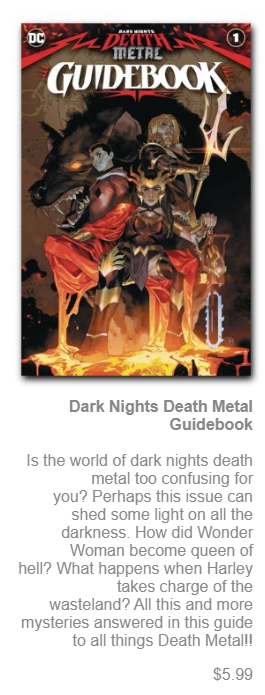In the past people have often claimed that high issue numbers have been a hurdle to getting new readers into comics, but is that really true? Many of us started reading comics in previous decades, with issue numbers in the 300's or higher. I know for example, I read plenty of high numbered Spider-Man books when I was growing up and I didn't have a problem getting into the stories.
Somewhere along the way, and maybe early 80's Batman or Claremont's consistently good work on X-Men are to blame, comic books went from a medium where you could get a bite of a complete story in each issue with some continuity connecting long-term plots, like Peter Parker's love life, wrapped around the morsel of action to a medium where you needed to read massive piles of books to understand the basic setup for a story.
I was looking at an e-mail from my local comic shop, Graham Crackers, and they had this as something they wanted to highlight for their customer base.

Think about that. Here they are, sending an e-mail to hundreds or thousands of active comic book readers, people that have specifically signed up for their mailing list. Presumably people who buy comic books every week, or at least on some other fairly regular interval.
And they're pushing a book that provides the background for a mini-series from DC Comics, a mini-series that's sure to be a top-seller. (I'm still waiting on number from Comichron to be released so we know just how many were sold.) It's easy to see why the publisher might think they need something like this, understanding the Death Metal series relies on the knowledge of the entire Justice League run in its current series, a couple of one-shots related to the current Justice League run, the entire Dark Nights Metal event and its spin-offs, the Batman Who Laughs mini-series, the first 8 or so issues of Superman/Batman, all of the Infected books, maybe some of Doomsday Clock, the Hell Arisen mini-series, and probably other books on top of it. That's a lot of product for a reader to keep up with just to understand the setup for the latest event, so publishing one little book for people to get caught up seems like it makes sense.
Other publishers have even done that in the past. When Aspen was relaunching some of their characters (like the excellent Executive Assistant Iris run by Blake Northcott), they also published out .25 cent books to help catch people on the character. DC is selling their catch-up book for $5.99, which is more expensive than most non-premium comics published today.
For the store, it would seem like pushing this would be less of a priority. They're sending an e-mail to a group of customers who are already interested in the product, many of whom are already likely purchasing it.
So does this indicate a lack of confidence in the new event's ability to get people up to speed with its own story? When I read it I just went "Oh the world was rewritten after Hell Arisen occurred" and just rolled with all the weird things, but not everyone is like that. If you've been trying to make sense of everything... good luck. You really need to be up to speed with 2 years of DC continuity to really know what's going on.
Is Dark Knights Death Metal going to herald the end of this ever increasingly intense 2 years of DC continuity? If not, I have trouble imagining what kind of guidebook they're going to need to explain the next big event in this ongoing series of big events.
All that said, I miss the days when comics were able to explain themselves. Even Claremont's X-Men didn't need too much investment to get up to speed with the story, between the narrator boxes and characters referencing events in previous issues, it was hard to feel too left out - more often than not one simply became curious about what had happened, or so I remember.
In the end, it was never the years of continuity or high numbers in the past that made comics inaccessible. There were other factors that kept readerships from growing once we got into the 90's. If anything, this current event in DC, which I admit I enjoyed the first issue of, is emblematic of what makes comics hard to get into. Not only is there an intense level of backstory to understand what seems like a crazy situation, but it's dense enough that they're selling a companion book to try to get people up to speed.
Imagine that your main exposure to Wonder Woman is her movie, or Batman in the Christopher Nolan movies and you go to get into DC comics now by hopping on board an event that from its name "Dark Night" seems to suggest it's all about Batman - and instead of something even vaguely resembling the movies you find Wonder Woman with an invisible chainsaw down in a fire-pit prison. That's pure inaccessibility right there.
It was never a mere number, it's the kind of content. Episodic entertainment with a relatively stable status quo is easy to get into. Story driven entertainment that's building upon years of convoluted canon and backstory is harder to get into if you've missed the jumping on point.
And while I liked the first issue of Death Metal, I'm not sure it did a good job of explaining its setup.